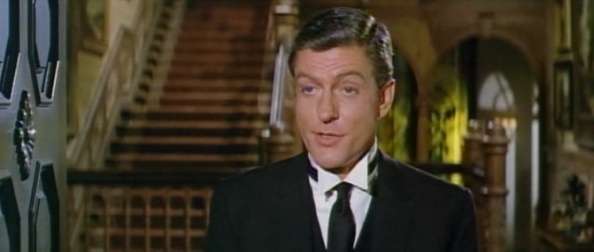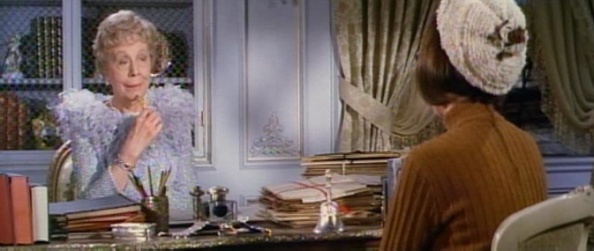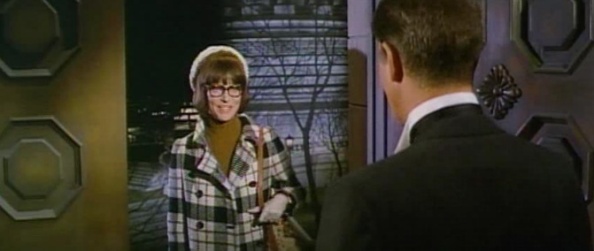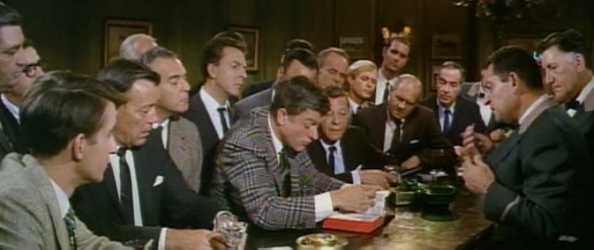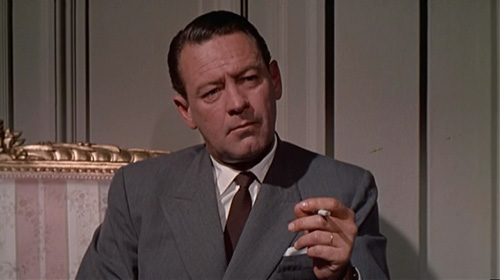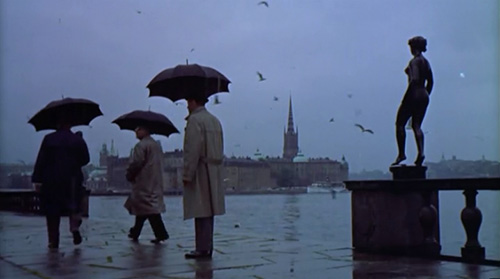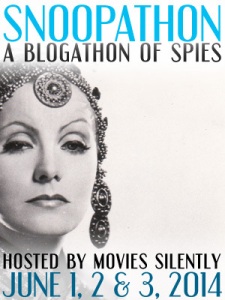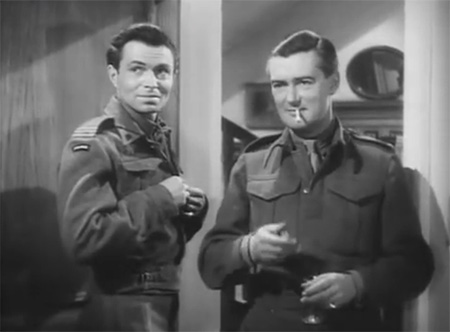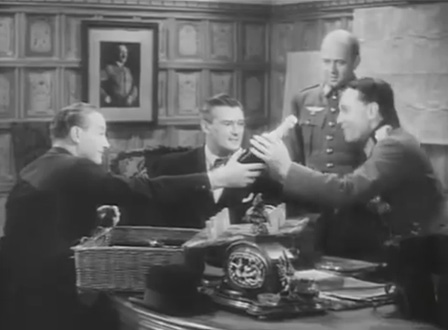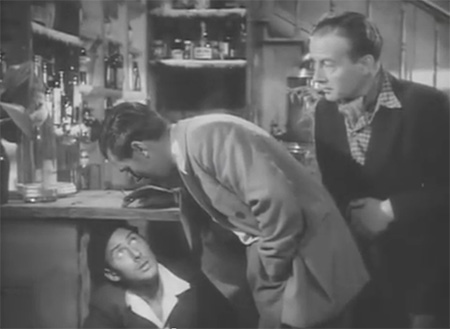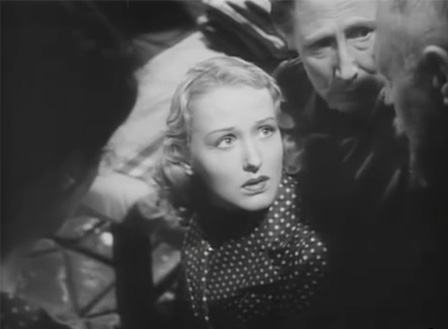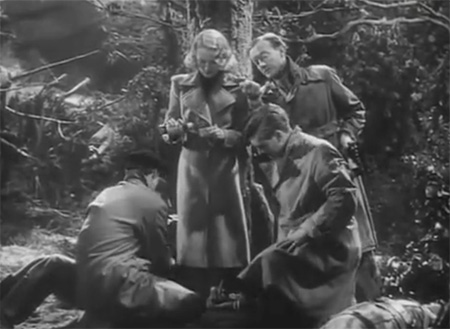Fitzwilliam (Dick Van Dyke) is a butler – one of a long line of butlers. His father was butler to the Woodworth family, and his father before him. Fitzwilliam serves the now-elderly Miss Vicki Woodworth. It’s a noble calling, if a little old-fashioned in this modern age. “And,” as Fitzwilliam points out, “terribly, terribly expensive.”
Miss Vicki maintains the enormous family home and creme-de-la-creme lifestyle to which she was born, and writes $20,000 checks to charities on the regular. Her mansion includes an impressive retinue of servants, who spend less time polishing the furniture than polishing a few skills that are, shall we say, less than 100% legal.
Fitzwilliam & Co. are hiding the awful truth: when her father died, she was left without a cent. Everything since has been provided by low cunning. Household expenses are funded by a shocking variety of illegal schemes. Servants pluck Miss Vicki’s charitable checks from visitors’ pockets while helping with their coats, or poach them from the outgoing mail. Fitzwilliam is the brainpower behind this high-class hub of crime, and he’s refined the discreet procural of cash to an art and a science.
The grand dame in question, Miss Vicki, is a strong-minded, strong-willed little old lady, wonderfully portrayed by Edith Evans. She has the total disregard for propriety that exists only in the best and wealthiest old families. She calls Fitzwilliam “Fitzwilly,” scolds policemen who pull her over, says “Poppycock!” to anything she deems silly, and has a warm heart beneath a crackling aristocratic exterior. She’s the leader of the Platypi (“as in ‘many platypuses’?”) – a sort of not-a-Cub Scouts group with principles based on Miss Vicki’s unique life philosophies. (Among other things, she believes it’s “the height of impertinence” to help little old ladies across the street.) Miss Vicki’s other pet project is a dictionary for people who can’t spell, which actually sounds brilliant in a pre-Google era.
It’s the dictionary project that knocks down the first domino in Fitzwilly’s perfectly run household. Miss Vicki, forgetting to inform Fitzwilly, engages the services of a secretary to assist with the dictionary.
Juliet Nowell (Barbara Feldon, AKA “Agent 99” of Get Smart) shows up. A surprised Fitzwilly makes a major error in judgment, tries to brush her off, and fires up every suspicious neuron in Juliet’s brain…for all the wrong reasons. Assuming she won’t get the job, she blasts the butler with a scathing rebuke: “Whatever you’re up to with that wonderful old lady, you ought to be ashamed of yourself!”
Fitzwilly makes his second error; in a fit of pique, he offers her the job at double the salary, because “she was so sure I wouldn’t.”
With an outsider in the house and a complicated plan worth $75,000 in progress, the gang frets over the potential for disaster. Piece of cake, Fitzwilly says. She’ll see that there’s nothing going on, they’ll make up an excuse for Miss Vicki to take a vacation, and she’ll be out within the week.
Fitzwilly is mistaken.
After Juliet unwittingly thwarts one too many schemes by her intrusions (including a disastrous incident involving one of Miss Vicki’s checks), Fitzwilly resolves to date her and make a pass, figuring that she’ll be so insulted she’ll quit.
This does not go as planned. Romance blossoms! And Fitzwilly is now juggling so many different schemes that he’s bound to drop one sometime.
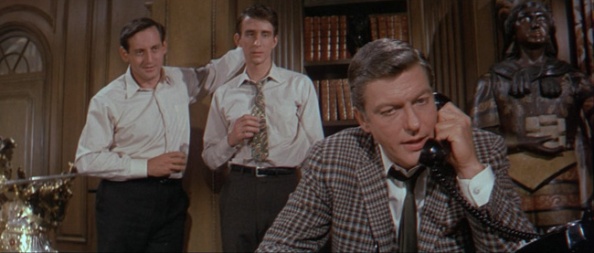
Source: Here’s Looking at Me, Kid
One by one, the dominoes keep falling, until they decide it’s time to call it quits. There’s just one big Last Heist to be finished before going straight…
All I will say about that is: If you’ve never seen a boldfaced robbery of Gimbel’s Department Store on Christmas Eve involving upturned umbrellas, Christmas carols, free TVs with any purchase (“no matter how small!”), and judicious use of the United States Postal Service, you haven’t lived.

Source: Here’s Looking at Me, Kid
There’s plenty to enjoy here for the crime comedy (and romantic comedy) fan.
Fitzwilly & Co.’s schemes are laid out in deliciously precise detail, from the Samson-and-Delilah bar trick (always good for quick cash in a pinch) to Serenity Through the Word’s Bibles for the bereaved (a long-term investment, but equally rewarding). Should you be interested in funding your own cash-poor, prestige-rich household, I’m sure there’s an idea you can adapt.
A very 1960s highlight of the film is TV actor spotting: “Hey! Isn’t he the guy who…” Starting with Dick Van Dyke and Barbara Feldon (of The Dick Van Dyke Show and Get Smart, respectively), the faces that pop up are a who’s who of characters on TV. You could watch the same actors at the theater on the weekend, and watch them at home on weekdays.
The strong cast of memorable character actors carries the film: John McGiver, Noam Pitlik, Harry Townes, Sam Waterston, and Cecil Kellaway – among many others. Maybe you don’t remember their names. But I bet you remember their faces! And voices – John Fiedler (AKA the voice of Piglet in Winnie-the-Pooh) makes an appearance as a naive piano store manager. Byron Casey (Stephen Strimpell) is hilarious as an interior decorator (in well over his head) who’s an integral part of that $75,000 scheme, and Noam Pitlik is memorable as a footman-turned-henchman.
Dick Van Dyke as Fitzwilly, of course, is the highlight. He pulls out his best fake English accent (and a fake French accent). He looks like he’s having a blast as this modern Moriarty for a good cause. It’s living on the edge, without a shred of guilt. So much so, in fact, that Miss Vicki’s assistant Grimsby (Anne Seymour) gets concerned, telling him that he keeps aiming higher, and he’s only doing it now because he enjoys it. Fitzwilly’s response: “But it’s just that I’m so good at it!”
John McGiver as Albert deserves special mention. He’s the wildcard in the gang: he has a guilty conscience. The retired priest turned servant lies and steals for Miss Vicki’s sake, but his scruples prevent him from participating wholeheartedly. Fitzwilly keeps him in hand, but he’s the weak point; with the right lever, the whole shebang could crack wide open. His solemn, deadpan line delivery is classic. Watch for him “explaining” to Juliet why he was picking someone’s pocket.
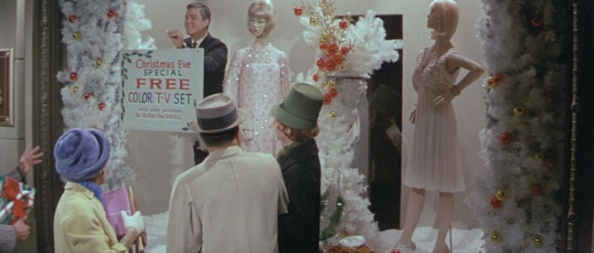
Source: Here’s Looking at Me, Kid
Fitzwilly was one of 1967’s family-friendly outings; it pushed no envelopes, though certain aspects would have been nixed under the Production Code. Luckily, it’s not dated: the combination of a Wodehousian setting, juxtaposed with the lively modernity of Dick Van Dyke and Barbara Feldon, plus a generous helping of the very 1960s crime/heist comedy genre, keeps it fresh and entertaining for the modern viewer. It also features a score by an up-and-coming composer credited here as “Johnny Williams.”
And just because you rarely, if ever, get to say this when reviewing a classic movie: if you like Dick Van Dyke as a thief in Fitzwilly, you can watch him play one again in Night at the Museum 3 this December. Yes, this December. 89 years old and still scheming!

This post is part of the 1967 in Film Blogathon, hosted by Silver Screenings and The Rosebud Cinema. Click here for all the entries on this fascinating year in the movies.

